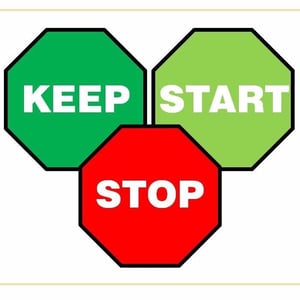 If you’re not approaching your Annual Planning process by asking your staff what you should start, stop, and keep doing, I strongly recommend you START doing it.
If you’re not approaching your Annual Planning process by asking your staff what you should start, stop, and keep doing, I strongly recommend you START doing it.
In Strategic Discipline we begin any engagement asking your employees to complete this survey. It provides vital information on internal and external customers, locating challenges your business is facing. In many cases without this survey the leadership team is often unaware what challenges frontline employees face.
Your front line employees know the obstacles your customers face, and the difficulties encountered delivery solutions. The people engaged in serving your customers, having interactions with your internal team to achieve the outcome you promise, know exactly what is working and what’s not.
As I shared in Company Colonoscopy: Start, Stop, Keep, Employee Survey there’s a lot of reasons to do this Employee Survey, and not just for Annual Planning.
 2020 has been an exceptional year. Most of your team spent it working from home. Getting feedback from front line employees will provide dramatic impact to support the direction you intend to take for 2021.
2020 has been an exceptional year. Most of your team spent it working from home. Getting feedback from front line employees will provide dramatic impact to support the direction you intend to take for 2021.
Let your team know their feelings and insights are important.
When you determine what actions you plan, make sure your team hears what you intend to do because of their feedback.
In Lie #2 The Best Plan Wins – Nine Lies About Work we shared why planning often doesn’t work, providing two examples of how front line feedback provided a Force Multiplier to win the Battle of Britain, and General McChrystal’s Iraq Plan. Visit the blog to understand how to Create a Vibrant Intelligence System.
Watch Marcus Buckingham explain why the Best Plan Wins doesn’t work and why your team is exhausted by planning. “If we’re going to get all of us to create a better future, we have got to help our people in the front lines engage with the world as it really is……… in a way that allows us not to have static, brittle strength, but to have tensile, adaptive strength, that fits with the dynamic, constantly changing nature of the world at large.”
Why Agile Company’s Win
In Fix Now or Later? We shared how author Jeff Sutherland in Scrum discovered waiting to address issues, whether it’s manufacturing or software development, takes 24x longer than fixing the issue up front.
“It took twenty-four times longer. If a bug was addressed on the day it was created, it would take an hour to fix; three weeks later, it would take twenty-four hours. It didn’t even matter if the bug was big or small, complicated or simple—it always took twenty-four times longer three weeks later. As you can imagine, every software developer in the company was soon required to test and fix their code on the same day.”
The same blog shares evidence your front line people are best suited to fix issues.
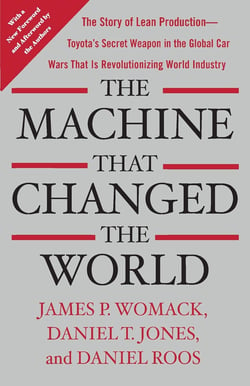 In The Machine That Changed the World, Dr. James Womack, the founder of the Lean Enterprise Institute at MIT, tells a story about the perils of “re-work.” Womack and his team looked at the manufacturing of cars to determine why some companies made cars faster and with fewer defects.
In The Machine That Changed the World, Dr. James Womack, the founder of the Lean Enterprise Institute at MIT, tells a story about the perils of “re-work.” Womack and his team looked at the manufacturing of cars to determine why some companies made cars faster and with fewer defects.
In Japan, such companies as Toyota, Honda, and Nissan spent an average of 16.8 hours making a luxury car. Parts went in at one end of the factory, and, about 17 hours later, a Lexus emerged. And they had 34 defects per hundred vehicles. In Europe Mercedes-Benz, Audi, and BMW took 57 hours to make a car. The results - 78.7 defects for every hundred vehicles.
Why did it take the Europeans so long? And why so many defects? BMW isn’t exactly known for making crappy cars. Here’s why: In a Toyota plant when a problem shows up on the line, every worker has the ability to stop the whole line. When that happens, everyone swarms around where the line stopped—not to yell at the guy for stopping the line, but to fix whatever problem is there. They don’t want any cars coming out the other end with things that have to be fixed. They fix the problem once, and it’s solved forever. If they don’t, that same defect could go into hundreds of vehicles.
FRONTLINE EMPLOYEE FEEDBACK MEANS OWNERSHIP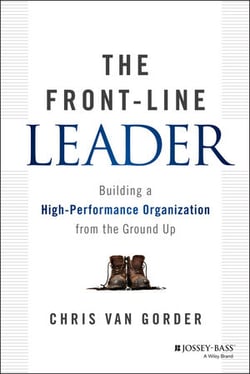
“When front-line workers are part of any solution, they own it every bit as much as leaders do. Everyone benefits—the organization, workers and, most of all, customers.”
― Chris Van Gorder, The Front-Line Leader: Building a High-Performance Organization from the Ground Up
Get your frontline team involved in growing your business. Before you begin Planning for 2021, ask your staff to complete a Start, Stop, Keep survey.
It’s time YOU achieve more! Create a culture where everyone is inspired to give their best. Contact us today to schedule a free exploratory meeting.
Growth demands Strategic Discipline.
To build an enduring great organization, requires disciplined people, disciplined thought, 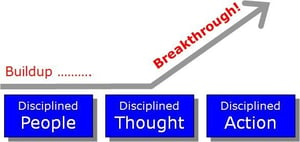 disciplined action, to produce superior results, and make a distinctive impact in the world.
disciplined action, to produce superior results, and make a distinctive impact in the world.
Discipline sustains momentum, over a long period of time, laying the foundations for lasting endurance.
A winning habit starts with 3 Strategic Disciplines: Priority, Metrics and Meeting Rhythms. -2.jpg?width=300&name=3%20Disciplines%20of%20Execution%20(Strategic%20Discipline)-2.jpg) Forecasting, accountability, individual, and team performance improve dramatically.
Forecasting, accountability, individual, and team performance improve dramatically.
Meeting Rhythms achieve a disciplined focus on performance metrics to drive growth.
Let Positioning Systems help your business achieve these outcomes on the Four most Important Decisions your business faces:
|
DECISION |
RESULT/OUTCOME |
|
PEOPLE |
|
|
STRATEGY |
|
|
EXECUTION |
|
|
CASH |
|
Positioning Systems helps mid-sized ($5M - $250M) business Scale-UP. We align your business to focus on Your One Thing! Contact dwick@positioningsystems.com to Scale Up your business! Take our Four Decisions Needs Assessment to discover how your business measures against other Scaled Up companies. We’ll contact you.
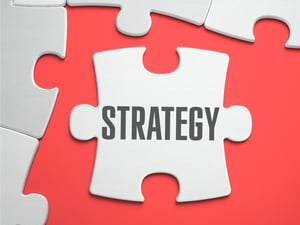 NEXT BLOG – Annual Planning – Strategy Process
NEXT BLOG – Annual Planning – Strategy Process
Your annual plan should focus on results. When the process includes: last year’s victories, performance measures, what we learned, can work on, and everyone’s objectives for next year, Annual Planning provides you the confidence to succeed next year. Next blog, a recommended agenda.






.jpeg?width=150&height=135&name=Hand%20with%20marker%20writing%20the%20question%20Whats%20Next_%20(1).jpeg)

